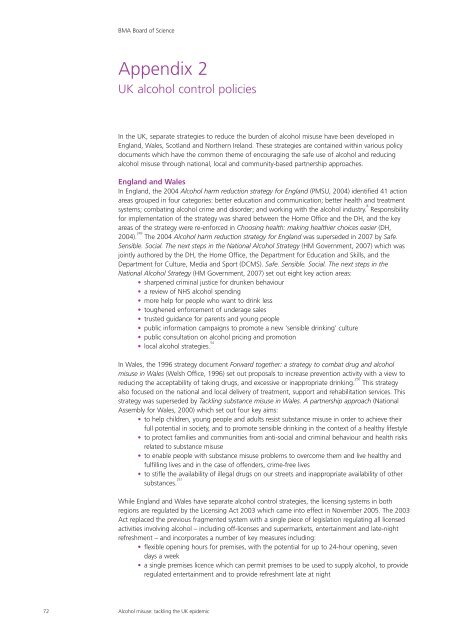Alcohol misuse: tackling the UK epidemic - London
Alcohol misuse: tackling the UK epidemic - London
Alcohol misuse: tackling the UK epidemic - London
Create successful ePaper yourself
Turn your PDF publications into a flip-book with our unique Google optimized e-Paper software.
72<br />
BMA Board of Science<br />
Appendix 2<br />
<strong>UK</strong> alcohol control policies<br />
In <strong>the</strong> <strong>UK</strong>, separate strategies to reduce <strong>the</strong> burden of alcohol <strong>misuse</strong> have been developed in<br />
England, Wales, Scotland and Nor<strong>the</strong>rn Ireland. These strategies are contained within various policy<br />
documents which have <strong>the</strong> common <strong>the</strong>me of encouraging <strong>the</strong> safe use of alcohol and reducing<br />
alcohol <strong>misuse</strong> through national, local and community-based partnership approaches.<br />
England and Wales<br />
In England, <strong>the</strong> 2004 <strong>Alcohol</strong> harm reduction strategy for England (PMSU, 2004) identified 41 action<br />
areas grouped in four categories: better education and communication; better health and treatment<br />
systems; combating alcohol crime and disorder; and working with <strong>the</strong> alcohol industry. 8<br />
Responsibility<br />
for implementation of <strong>the</strong> strategy was shared between <strong>the</strong> Home Office and <strong>the</strong> DH, and <strong>the</strong> key<br />
areas of <strong>the</strong> strategy were re-enforced in Choosing health: making healthier choices easier (DH,<br />
2004). 249<br />
The 2004 <strong>Alcohol</strong> harm reduction strategy for England was superseded in 2007 by Safe.<br />
Sensible. Social. The next steps in <strong>the</strong> National <strong>Alcohol</strong> Strategy (HM Government, 2007) which was<br />
jointly authored by <strong>the</strong> DH, <strong>the</strong> Home Office, <strong>the</strong> Department for Education and Skills, and <strong>the</strong><br />
Department for Culture, Media and Sport (DCMS). Safe. Sensible. Social. The next steps in <strong>the</strong><br />
National <strong>Alcohol</strong> Strategy (HM Government, 2007) set out eight key action areas:<br />
sharpened criminal justice for drunken behaviour<br />
a review of NHS alcohol spending<br />
more help for people who want to drink less<br />
toughened enforcement of underage sales<br />
trusted guidance for parents and young people<br />
public information campaigns to promote a new ‘sensible drinking’ culture<br />
public consultation on alcohol pricing and promotion<br />
local alcohol strategies. 54<br />
In Wales, <strong>the</strong> 1996 strategy document Forward toge<strong>the</strong>r: a strategy to combat drug and alcohol<br />
<strong>misuse</strong> in Wales (Welsh Office, 1996) set out proposals to increase prevention activity with a view to<br />
reducing <strong>the</strong> acceptability of taking drugs, and excessive or inappropriate drinking. 250<br />
This strategy<br />
also focused on <strong>the</strong> national and local delivery of treatment, support and rehabilitation services. This<br />
strategy was superseded by Tackling substance <strong>misuse</strong> in Wales. A partnership approach (National<br />
Assembly for Wales, 2000) which set out four key aims:<br />
to help children, young people and adults resist substance <strong>misuse</strong> in order to achieve <strong>the</strong>ir<br />
full potential in society, and to promote sensible drinking in <strong>the</strong> context of a healthy lifestyle<br />
to protect families and communities from anti-social and criminal behaviour and health risks<br />
related to substance <strong>misuse</strong><br />
to enable people with substance <strong>misuse</strong> problems to overcome <strong>the</strong>m and live healthy and<br />
fulfilling lives and in <strong>the</strong> case of offenders, crime-free lives<br />
to stifle <strong>the</strong> availability of illegal drugs on our streets and inappropriate availability of o<strong>the</strong>r<br />
substances. 251<br />
While England and Wales have separate alcohol control strategies, <strong>the</strong> licensing systems in both<br />
regions are regulated by <strong>the</strong> Licensing Act 2003 which came into effect in November 2005. The 2003<br />
Act replaced <strong>the</strong> previous fragmented system with a single piece of legislation regulating all licensed<br />
activities involving alcohol – including off-licenses and supermarkets, entertainment and late-night<br />
refreshment – and incorporates a number of key measures including:<br />
flexible opening hours for premises, with <strong>the</strong> potential for up to 24-hour opening, seven<br />
days a week<br />
a single premises licence which can permit premises to be used to supply alcohol, to provide<br />
regulated entertainment and to provide refreshment late at night<br />
<strong>Alcohol</strong> <strong>misuse</strong>: <strong>tackling</strong> <strong>the</strong> <strong>UK</strong> <strong>epidemic</strong>
















